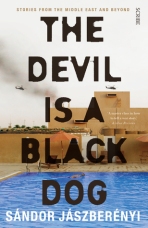 This collection of short stories, translated from Hungarian by Matt Henderson Ellis, offers a truly breathtakingly stark glance—in a series of carefully constructed snapshots, mirroring each in their haunting portrayal of violence—at the horror of countries torn apart by war. The Devil is a Black Dog by Sándor Jászberényi explores the destruction that plagues these obscure, far-away nations—making us feel as though it is the reader who stands alone, dust and sand sticking to one’s clothes.
This collection of short stories, translated from Hungarian by Matt Henderson Ellis, offers a truly breathtakingly stark glance—in a series of carefully constructed snapshots, mirroring each in their haunting portrayal of violence—at the horror of countries torn apart by war. The Devil is a Black Dog by Sándor Jászberényi explores the destruction that plagues these obscure, far-away nations—making us feel as though it is the reader who stands alone, dust and sand sticking to one’s clothes.
It’s to Jászberényi’s credit that the tales that make up this thin volume never quite feel like fiction: the image of a photojournalist’s jacket riddled with bullets—or of a man, lined up with others against a wall and offered a smoke, before being shot by a commander as that very same, just-lit cigarette hangs from his lips—is all too real. Similar images adorn our newspapers and television news channels on a daily basis, often to the point where we have, more than ever, become desensitized to the violence of war.
Despite that, Jászberényi’s stripped-back narrative style—which does not concern itself with political detail or very much background information at all—works effectively in bringing to the forefront the harsh realities of these war zones. In a manner that evokes Ernest Hemingway—and in particular the short vignettes that are interspersed between the stories of his first collection, In Our Time—Jászberényi gives us just enough, concentrating on the personal reactions of the people caught up in the violence, rather than the detail behind why these things are happening. All of the stories in The Devil is a Black Dog can be read without prior knowledge of the specific conflicts that are taking place.
At the same time, there is a peculiar sense of displacement; despite the sudden and often shocking images of bullet-ridden bodies and blood-spattered walls, our narrator—who, when all said and done is Jászberényi himself, the stories based on his time spent as a photojournalist in the likes of Cairo and Chad—mostly stays apart from the action, drinking whisky on a rooftop bar while and playing games on his phone while remaining detached. Ultimately, the reader struggles with this attachment too.
Perhaps “favourite” isn’t the right word for a collection of this kind, but for this reader there were certain stories that jumped out more than others. “The Dead Ride Fast”, the final tale in this collection, tells the story of two photojournalists—our reoccurring character Marosh, who often narrates throughout the book, and a scarred German woman—both of whom are trying to make the most of living in this world of rebellion and gunfire. “The Field’ is effective in a different way: its cruel conclusion—where a British humanitarian aid worker sits complaining about the delays in Heathrow airport, while the village she has just left is being burned to the ground—is a punch to the gut.
Each short story in Jászberényi’s The Devil is a Black Dog offers something different, even if the overreaching theme—the consequences of war—remains the same, as we’re swept along from Benghazi to Budapest. Perhaps inevitably—by the very nature of the author’s personal experiences being written about via fiction rather than, say, memoir—the writing is assured: Jászberenyi knows exactly what he wants to say, but more importantly how he wants to say it.
This, Jászberényi’s first collection, is an impressive read—and this reader at least will be looking forward to future publications.
——-
Thank you to the lovely people at @ScribeUKbooks for the ARC.
